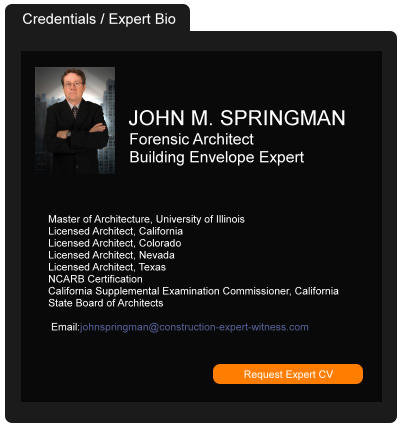ADA Lawsuits Spur Renovation Work in Fresno Area
November 06, 2013 —
CDJ STAFFThe El Gallo restaurant in Clovis, California has completed more than $45,000 worth of accessibility upgrades, ranging from installing signs for handicap parking to an $8,000 wheelchair-accessible ramp. The restaurant closed in 2010 when they were sued over alleged Americans with Disabilities Act (ADA) violations.
But the El Gallo was only the first Fresno-area business hit with an accessibility lawsuit. And others wanted to avoid getting sued at all. Donald Bremseth, an architect working in Clovis, said that designing modifications to older buildings to bring them into compliance with the ADA has kept him busy, designing dozens of projects in the area.
Daniel Zoldak, vice president of Lars Anderson & Associates, noted at on one inspection, he saw about 50 ADA violations, and with the fines at least $2,000 per violation, $10,000 or $20,000 of renovations doesn’t look so bad. That’s under the new law, which also allows a business 30 days to get into compliance. Under the old law, the minimum fine was $4,000.
Read the court decisionRead the full story...Reprinted courtesy of
Construction Defect Bill Removed from Committee Calendar
February 12, 2013 —
CDJ STAFFColorado State Senator Mark Scheffel has removed Senate Bill 13-052 from the Senate Judiciary Committee’s calendar because he feels an upcoming study on construction near transit centers will be important for the consideration of the bill. SB 13-052 would affect construction defect claims in communities that were within a half mile of public transportation. Critics claim it would gut construction defect protections, as even a bus stop would count as a “mass transit center.”
Scheffel says he doesn’t know what the study will find, but says that whether he likes or hates it, it will be relevant.
Read the court decisionRead the full story...Reprinted courtesy of
Top 10 Cases of 2019
February 10, 2020 —
Jeffrey J. Vita, Grace V. Hebbel & Andrew G. Heckler - Saxe Doernberger & Vita, P.C.In the 2019 edition of SDV’s Top Ten Insurance Cases, we probe wiretapping claims under an armed security services policy, delicately sniff out E&O coverage for a company using cow manure to create electricity, scour the earth for coverage for crumbling foundation claims, and inspect D&O policies for government investigation coverage. In addition, we preview some important and exciting decisions due in 2020. Without further ado, SDV raises the curtain on the most informative and influential insurance
coverage decisions of 2019.1
1.
ACE American Ins. Co. v. American Medical Plumbing, Inc.,
206 A.3d 437 (N.J. Super. Ct. App. Div. 2019)
April 4, 2019
Is waiver of subrogation language in a standard AIA201 contract sufficient to bar an insurer’s subrogation rights?
The New Jersey Supreme Court held that it was. Equinox Development obtained a comprehensive blanket all-risk policy with limits of $32 million per occurrence from ACE American Ins. Co. (“ACE”). The policy covered Equinox’s new project in Summit, New Jersey. Equinox hired Grace Construction as GC, who in turn subcontracted the plumbing scope of work to American Medical Plumbing, Inc. (“American”). After completion of the work under the subcontract, a water main failed and flooded the entire project. ACE paid the limits of the policy and subrogated against American to recover its losses. American argued that there was a waiver of subrogation in the AIA201 contract that barred the suit. ACE challenged the validity of the AIA provision, arguing that it applied only to claims before completion of construction and that it only applied to damage to the work itself and not to adjacent property. The court rejected both arguments, finding that the AIA provision effectively barred ACE’s subrogation claim. This decision provides guidance on a frequently used contract form for contractors across the country.
Reprinted courtesy of Saxe Doernberger & Vita, P.C. attorneys
Jeffrey J. Vita,
Grace V. Hebbel and
Andrew G. Heckler
Mr. Vita may be contacted at jjv@sdvlaw.com
Ms. Hebbel may be contacted at gvh@sdvlaw.com
Mr. Heckler may be contacted at agh@sdvlaw.com
Read the court decisionRead the full story...Reprinted courtesy of
Don’t Waive Too Much In Your Mechanic’s Lien Waiver
December 22, 2019 —
Christopher G. Hill - Construction Law MusingsIn the past few years, the Virginia General Assembly has, with certain caveats, precluded pre-furnishing waiver of mechanic’s lien rights. While this essentially outlawed the types of mechanic’s lien waiver clauses that pervaded construction contracts in Virginia, the key to the previous sentence is “pre-furnishing.” What the General Assembly left intact were the usual waivers of mechanic’s lien rights typically required to be provided to Owners and others in the payment chain in exchange for payment.
These lien waivers come in a few “flavors” from conditional to unconditional, partial to full. Their terms usually include an acknowledgement of receipt of payment (we’ll get to this later), and a statement that the one seeking payment knows of no possible claims by lower tier subcontractors and then waives all mechanic’s lien rights against the property for work performed and included in the request for payment. Often over my years as a Virginia construction attorney, I have noticed that these waivers are often signed without comment or review. They are just part of the process and more often than not are not even an issue for most projects. Of course, if they are an issue they can be a big one, and their terms can come back to bite a claimant that has not properly vetted them.
The first potential issue is waiving lien rights while acknowledging receipt prior to actual receipt of the check or wire. Many of the waiver forms that are out there list a payment amount, or possibly simply state that the waiver is in exchange for some small payment, and then state “receipt of which is acknolwedged” or something similar. The issue here is that receipt may not have happened yet because these lien waivers are submitted as part of the payment package in order to get paid in the first place. In short, should you sign the waiver prior to payment, you may have acknowledged a non-event and in the event of non-payment have a written document stating that you waived your claim to a lien for that money. What a court would do with this, I am unsure, but why risk it? My advice, be sure your waiver is contingent on actual clearance of payment as well as receipt.
Read the court decisionRead the full story...Reprinted courtesy of
The Law Office of Christopher G. HillMr. Hill may be contacted at
chrisghill@constructionlawva.com
California Assembly Bill Proposes an End to Ten Year Statute of Repose
May 09, 2011 —
CDJ STAFFCalifornia Assemblyman Furutani has introduced a bill that if passed would eliminate the ten year statute of repose in certain construction defect cases. The statute of repose would not apply when “an action in tort to recover damages for damage to real or personal property, or for personal injury or wrongful death from exposure to hazardous or toxic materials, pollution, hazardous waste, or associates environmental remediation activities,” according to the latest amended version of AB 1207.
�When Furutani first introduced the bill, it was aimed at small businesses only. However, the description of the bill, which read, “An act to amend Section 14010 of the Corporations Code, relating to small businesses” has been stricken from the bill, and it has been amended to read, “An act to amend Section 337.15 of the Code of Civil Procedure, relating to civil actions.”
�The change in the bill’s intent has caused some outcry among attorneys in the blogosphere. For instance, Sean Sherlock of Snell & Wilmer stated that “the proposed amendment is unnecessary, and would upset nearly 50 years of deliberative legislation and judicial precedent on construction defects liability and the 10–year statute — all apparently motivated by a decision in a single, isolated Superior Court lawsuit that has not yet been reviewed by the court of appeal.” Sherlock is referring to Acosta v. Shell Oil Company, in which the Superior Court agreed to dismiss the plaintiffs’ claims against the developer based in part on the ten year statute of repose. AB 1207 was amended five days after the ruling in Acosta v. Shell Oil Company.
�California AB 1207 has been re-referred to the Judiciary Committee.
�Read the full story…
Read the court decisionRead the full story...Reprinted courtesy of
Canadian Developer Faces Charges After Massive Fire on Construction Site
August 27, 2014 —
Beverley BevenFlorez-CDJ STAFFA fire leveled an apartment construction site in Canada last December, which resulted in almost two dozen charges relating to fire safety precautions and lack of cooperation with the Ministry of Labour’s investigation, according to CKWS TV. The Ministry of Labour has recently “laid 22 charges against three individuals and two companies—Jay Patry Enterprises Inc. and Steimach Property Management Inc.”
CKWS TV reported that “[c]harges include failing to provide adequate space for workers to evacuate during an emergency, failing to protect the health and safety of workers and failing to inspect every fire extinguisher for defects or deterioration.” Jason Patry, Nathan Patry and Troy Stelmach have been charged with “obstructing and providing false information to a ministry of labour inspector, as well as failing to make the inspection process an easy one.”
Read the court decisionRead the full story...Reprinted courtesy of
Ambiguity Kills in Construction Contracting
February 15, 2018 —
Christopher G. Hill – Construction Law MusingsWell, I’m back and hope to have a more consistent publishing schedule moving forward. I appreciate the continued readership through what has been a busy time for
my solo construction practice over the last couple of months. Now, back to our program. . .
Here at Construction Law Musings, I have often beaten the drum of
a solid contract that leaves as little as possible to chance or the dreaded “grey areas” where we construction lawyers like to make money. An example of the issues that can arise from ambiguity can be found in a case from 2017 in the
Western District of Virginia, W.C. English, Inc. v. Rummel, Klepper & Kahl, LLP et al
Read the court decisionRead the full story...Reprinted courtesy of
Christopher G. Hill – The Law Officeof Christopher G. Hill, PC
Keep It Simple: Summarize (Voluminous Evidence, That Is...)
October 02, 2023 —
Steve Swart - The Dispute Resolver"The most complex analyses grow beautifully simple as they become public objects.” Philip Rieff, Fellow Teachers (1973), quoted in JOHN BARTLETT, BARTLETT’S FAMILIAR QUOTATIONS 800 (Geoffrey O’Brien gen. ed., 18th ed. 2012)
In a recent ABA Forum on Construction Law Webinar, a panelist with substantial experience as an arbitrator explained that documents are the most important evidence in a construction dispute. Fact-finders, she said, focus on contemporaneous project records more than witness testimony to vet what happened.
But, even a small to mid-sized construction project can generate millions of pages of documents. That is particularly true when disputes involve loss of productivity, delay, acceleration, and disruption. The volume of records related to entitlement and damages (e.g., timesheets, accounting, equipment logs, schedule files, meeting minutes, etc.) can overwhelm and confuse — not to mention bore — the fact finder.
Read the court decisionRead the full story...Reprinted courtesy of
Steve Swart, Williams MullenMr. Swart may be contacted at
sswart@williamsmullen.com


































































